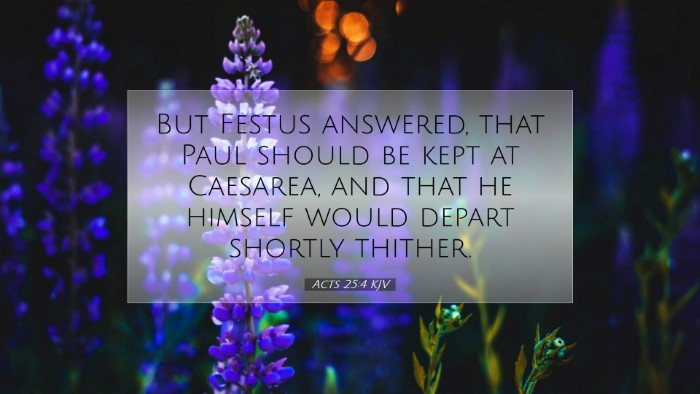Old Testament
Genesis Exodus Leviticus Numbers Deuteronomy Joshua Judges Ruth 1 Samuel 2 Samuel 1 Kings 2 Kings 1 Chronicles 2 Chronicles Ezra Nehemiah Esther Job Psalms Proverbs Ecclesiastes Song of Solomon Isaiah Jeremiah Lamentations Ezekiel Daniel Hosea Joel Amos Obadiah Jonah Micah Nahum Habakkuk Zephaniah Haggai Zechariah MalachiActs 25:4
Acts 25:4 KJV
But Festus answered, that Paul should be kept at Caesarea, and that he himself would depart shortly thither.
Acts 25:4 Bible Commentary
Commentary on Acts 25:4
Acts 25:4 states: "But Festus answered that Paul should be kept at Caesarea, and that he himself would depart shortly thither." This verse is a part of the narrative concerning Paul's trials and the political intrigues surrounding his imprisonment, and it serves as a vital link in the chain of events that lead to the presentation of the Gospel before the Roman Empire's highest authorities.
Contextual Background
The Apostle Paul had been imprisoned for two years in Caesarea, facing various accusations from the Jewish leaders. The Roman governor Festus, who succeeded Felix, sought to manage this volatile situation as he began his administration. Understanding the tension between the Jews and Paul, Festus decided to keep Paul in Caesarea to quell any immediate unrest.
Insights from Commentators
Matthew Henry's Commentary
Henry emphasizes the providential hand of God throughout the events in Paul's life. He notes that:
- Divine Oversight: The delay of Paul’s trial illustrates how God orchestrates events for His purposes. Even in chains, Paul was still advancing the Gospel.
- Political Maneuvering: Festus's decision to keep Paul represents a cautious attempt to navigate the political landscape of Judea, reflecting the complexities faced by leaders of the day.
Albert Barnes' Notes
Barnes discusses the political implications of Festus’s statement. He highlights the following points:
- Governance and Justice: Festus is shown as a ruler who is concerned about justice but is also wary of inciting conflict with the Jewish populace.
- Preservation of Order: By keeping Paul in Caesarea, Festus aims to maintain order while also gathering more information to understand the case better.
Adam Clarke's Commentary
Clarke provides a detailed examination of the sociopolitical environment during Festus’s tenure:
- Historical Context: Understanding the tumultuous relationship between the Jews and the Roman authorities is critical to unpacking Festus's strategy.
- Paul's Position: Clarke suggests that Paul’s continued imprisonment was not just a matter of legal proceedings, but a testament to his role in God’s plan, giving Paul the opportunity to witness even to kings and governors.
Theological Reflections
The implications of this verse extend beyond historical narrative, inviting deeper theological reflection:
- God’s Sovereignty: The verse underscores the theme of divine sovereignty; God utilizes even the circumstances of imprisonment to fulfill His mission.
- Faith in Adversity: Paul’s experience teaches believers about maintaining faith amidst trials and injustices, trusting in God’s presence and purpose.
Practical Applications
For pastors, theologians, and students of the Bible, Acts 25:4 offers significant lessons:
- Leadership Lessons: Understanding how to navigate complex situations while upholding justice is crucial for church leaders today.
- Advocacy for the Oppressed: Paul’s situation calls for believers to stand firm in advocating for justice and truth, even when facing opposition or adversity.
- Witnessing in Dark Places: Paul’s endurance serves as an example of how to witness for Christ in difficult and seemingly hopeless situations.
Conclusion
Acts 25:4 may seem like a simple statement about Paul’s imprisonment, but it layers a depth of meaning regarding God’s sovereign guidance over human affairs. Through the insights of Matthew Henry, Albert Barnes, and Adam Clarke, we see the complex interaction of faith, politics, and divine purpose. May the reflections on this passage inspire deeper engagement with the text and greater boldness in living out the Gospel in all circumstances.


